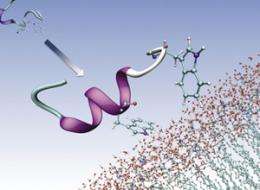Multiple personalities of an HIV protein

A research team comprising NPL, the University of Edinburgh and IBM's Watson Research Center have published research about the structure of an HIV-1 protein.
The research provides a new insight into how the changes in structure of a small part of an HIV protein may affect the infection of the virus into healthy cells. The team was able to observe marked changes in this part of the protein implicated in the early stages of the infection by using a combination of powerful experimental and computational tools.
This information is important as it gives us a better understanding of how HIV infections take hold at the molecular level. Drug designers could use this information to develop treatments that stop HIV from entering a healthy cell and infecting it.
This research is a part of the NPL-led international research project 'Multiscale measurements in biophysical systems', which is jointly funded by NPL and the Scottish Universities Physics Alliance.
The team's journal article detailing this research was selected as the featured article in the January 2011 issue of the journal Physical Chemistry Chemical Physics - the Royal Society of Chemistry's premier forum for physical chemistry research.
More information:
Read journal article: Autonomous folding in the membrane proximal HIV peptide gp41659-671: pH tuneability at micelle interfaces
Provided by National Physical Laboratory

















